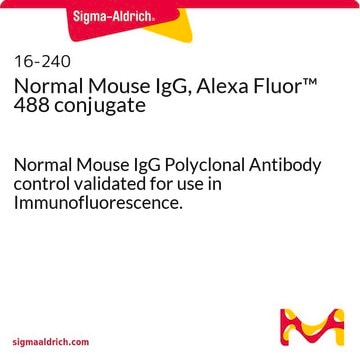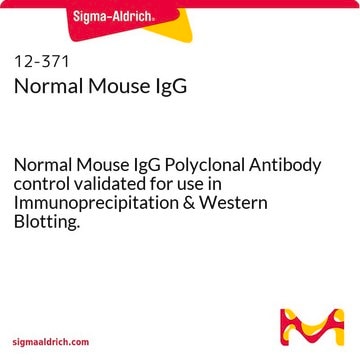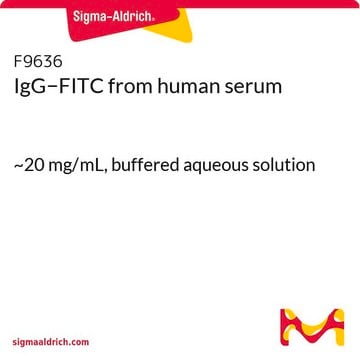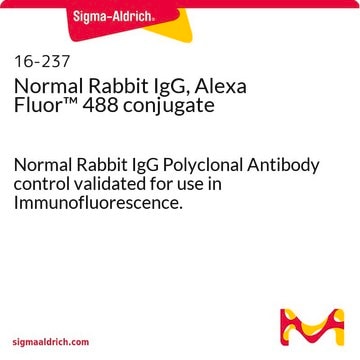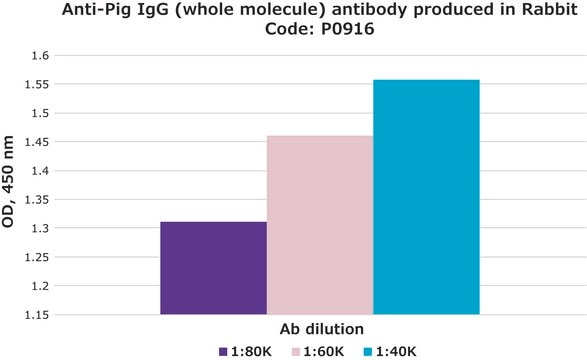12-487
Normal Mouse IgG, FITC conjugate
Normal Mouse IgG Polyclonal Antibody control validated for use in Immunofluorescence.
Sign Into View Organizational & Contract Pricing
All Photos(1)
About This Item
UNSPSC Code:
12352203
eCl@ss:
32160702
NACRES:
NA.41
Recommended Products
biological source
mouse
Quality Level
conjugate
FITC conjugate
antibody form
purified immunoglobulin
clone
polyclonal
manufacturer/tradename
Upstate®
technique(s)
immunofluorescence: suitable
shipped in
dry ice
target post-translational modification
unmodified
Application
Research Category
Secondary & Control Antibodies
Secondary & Control Antibodies
Research Sub Category
Whole Immunoglobulin Secondary Antibodies
Whole Immunoglobulin Secondary Antibodies
Quality
Suitable for use as an IgG control in applications where a FITC conjugate is useful, such as Immunocytochemistry.
Physical form
PBS with 5mg/ml BSA and 0.05% sodium azide
Storage and Stability
1 year at -20°C
Legal Information
UPSTATE is a registered trademark of Merck KGaA, Darmstadt, Germany
Disclaimer
Unless otherwise stated in our catalog or other company documentation accompanying the product(s), our products are intended for research use only and are not to be used for any other purpose, which includes but is not limited to, unauthorized commercial uses, in vitro diagnostic uses, ex vivo or in vivo therapeutic uses or any type of consumption or application to humans or animals.
Storage Class Code
12 - Non Combustible Liquids
WGK
WGK 2
Flash Point(F)
Not applicable
Flash Point(C)
Not applicable
Certificates of Analysis (COA)
Search for Certificates of Analysis (COA) by entering the products Lot/Batch Number. Lot and Batch Numbers can be found on a product’s label following the words ‘Lot’ or ‘Batch’.
Already Own This Product?
Find documentation for the products that you have recently purchased in the Document Library.
Mohammad-Taghi Bahreyni-Toossi et al.
Iranian journal of basic medical sciences, 25(9), 1104-1109 (2022-10-18)
To enhance the efficiency of radiotherapy (RT), implementation of individual-based treatment is essential. In this way, determining individual intrinsic radiosensitivity (IRS) can be useful to achieve minimal adverse effects of RT. The present study aimed to identify IRS of breast
Dörthe Schaue et al.
Antioxidants (Basel, Switzerland), 11(9) (2022-09-24)
Nuclear factor erythroid 2-related factor 2 (NRF2) is recognized as a master transcription factor that regulates expression of numerous detoxifying and antioxidant cytoprotective genes. In fact, models of NRF2 deficiency indicate roles not only in redox regulation, but also in
Ronni Nielsen et al.
Molecular and cellular biology, 26(15), 5698-5714 (2006-07-19)
Investigations of the molecular events involved in activation of genomic target genes by peroxisome proliferator-activated receptors (PPARs) have been hampered by the inability to establish a clean on/off state of the receptor in living cells. Here we show that the
K Yalla et al.
Molecular psychiatry, 23(5), 1278-1286 (2017-07-21)
Disrupted in schizophrenia 1 (DISC1) is a multi-functional scaffolding protein that has been associated with neuropsychiatric disease. The role of DISC1 is to assemble protein complexes that promote neural development and signaling, hence tight control of the concentration of cellular
Jurrian K de Kanter et al.
Cell stem cell, 28(10), 1726-1739 (2021-09-09)
Genetic instability is a major concern for successful application of stem cells in regenerative medicine. However, the mutational consequences of the most applied stem cell therapy in humans, hematopoietic stem cell transplantation (HSCT), remain unknown. Here we characterized the mutation
Our team of scientists has experience in all areas of research including Life Science, Material Science, Chemical Synthesis, Chromatography, Analytical and many others.
Contact Technical Service
